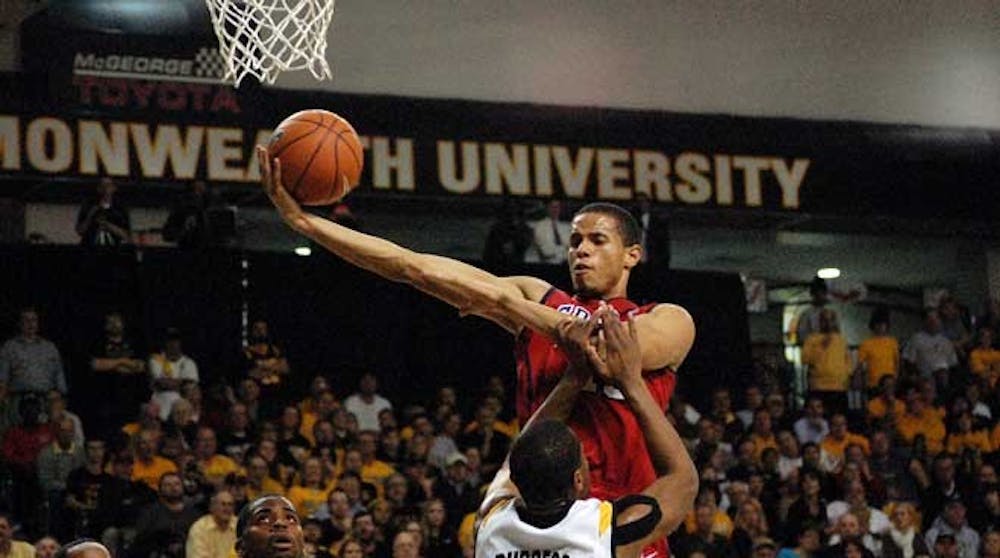The Atlantic 10, the University of Richmond's athletic conference for all sports except football, has added Virginia Commonwealth University and Butler University for the 2012-13 seasons. With these additions, the A-10 has 16 teams, though certain schools do not participate in certain sports.
All 16 university teams will compete in men's basketball, which has produced much of the buzz surrounding these two schools. The teams from Butler and VCU combined have made three Final Four appearances in the NCAA tournament during the past three seasons. Butler reached the finals in 2010 and 2011, while VCU reached the semifinals in 2011, having lost to Butler.
"Both are very successful men's basketball programs and will enhance the A-10 nationally," Richmond Athletic Director Jim Miller said.
Both teams elected to leave their respective conferences immediately because of rules prohibiting them from competing in conference championships. Butler comes from the Horizon League and VCU from the Colonial Athletic Association, which serves as Richmond's football conference. VCU does not field a football team.
VCU's departure will have no direct impact on the CAA football conference, Miller said.
With 16 teams instead of the traditional 14, the A-10 was forced to make adjustments to its scheduling. Pairings for men's basketball were announced Tuesday, with each team playing one conference opponent twice in a home-and-home series and playing all other conference opponents once. Richmond will predictably play its home-and-home series with newly added VCU, often referred to as Richmond's "cross-town rival."
"Now you'll be talking about standings on the line," said Richmond men's basketball coach Chris Mooney of how VCU's move would affect the rivalry. "It'll give us the opportunity to play more games -- more games that are meaningful and more special games and increase the overall feeling."
Traditionally, the two teams met during the non-conference schedule in what was called the Farm Bureau Insurance Black & Blue game.
Mooney hopes the game will continue to be called that because it has a nice ring to it, he said, but that will be a contract decision between the two schools and Farm Bureau Insurance.
Richmond left the CAA for the A-10 in 2001. Its reasons then were the same as VCU's reasons now, Mooney said.
"It's a better basketball conference [...] just better than the CAA top to bottom," he said. "You hope your recruiting can improve, but you know that the level of your competition is going to improve.
"When you have a good year, you don't necessarily have to win the conference tournament [to get into the NCAA tournament]. You have a chance at an at-large bid."
Enjoy what you're reading?
Signup for our newsletter
The new teams will bring coaches Shaka Smart (VCU) and Brad Stevens (Butler) to the A-10. Along with Mooney, all three are in their mid-to-late 30s, considered relatively young by NCAA coaching standards. Mooney and Smart have often been compared since Richmond and VCU's runs in the 2011 NCAA tournament (UR made the Sweet 16).
Mooney has built a good relationship with Smart through their joint efforts to raise more money for the Richmond chapter of Coaches vs. Cancer, a charity supporting the American Cancer Society, Mooney said.
Mooney said he had talked to Smart quickly after VCU's decision was announced to discuss what they would do about the non-conference game the teams had originally scheduled. The full schedules will be released in August.
The conference will only field 16 teams for one season, with the announced departures of Temple University to the Big East Conference and University of North Carolina at Charlotte to Conference USA for the 2013-14 seasons.
With the A-10 not providing a platform for football, Temple and Charlotte's decisions were made to accommodate their FCS football programs, Miller said.
Mooney said losing Temple was a huge loss for the conference.
"They have more tradition than any mid-major in the whole country," he said. "I think you can't really underestimate how good Temple is. They've been so good for so long that they're a little bit forgotten.
"I think that Charlotte is a tough loss, but we didn't probably see them at their best for whatever reason while they were here."
The four schools' transitions are part of major conference realignments that have been taking place throughout the country in the past two years.
Miller said these changes were part of a natural progression of conference affiliation that had always been part of college athletics.
Mooney wished there was more feeling of stability, he said.
"As a sports fan, it's kind of hard to keep up with," he said. "Like watching Nebraska play a Big 10 football game is weird. Watching Missouri go to the SEC is going to to be strange, so I don't love it because I like the traditions and geographic rivalries.
"You never know what's going to happen one day to the next or one year to the next with conferences. I think [stability] is better for the fans. Just that feeling like, 'Oh, we're in this cycle now. Hopefully if we improve, we can catch the Alabama's or Kentucky's or whoever it is.'"
Contact staff writer David Weissman at david.weissman@richmond.edu
Support independent student media
You can make a tax-deductible donation by clicking the button below, which takes you to our secure PayPal account. The page is set up to receive contributions in whatever amount you designate. We look forward to using the money we raise to further our mission of providing honest and accurate information to students, faculty, staff, alumni and others in the general public.
Donate Now



